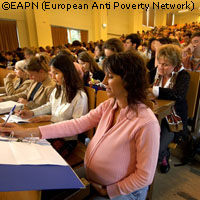EU Lifelong Learning Programme launched
The EU's new EUR7 billion Lifelong Learning Programme was given the go ahead at a conference organised by the German EU Council Presidency in Berlin on 7 May. The German Federal Minister for Education and Research, Annette Schavan, the European Commissioner for Education, Training, Culture and Youth, Ján Figel', and the President of the Conference of Länder Ministers of Education (KMK), Professor Jürgen Zöllner, were all on hand to launch the seven year education programme. The aim of the new programme is to create a European Education Area to meet the Lisbon goal of becoming the most competitive, knowledge-based economy in the world by 2010. 'This programme is the most important instrument for implementing European education policy,' said Ms Schavan. In addition to the increased mobility of teachers and learners of all ages, the German minister emphasised that the European Education Area would not only remove national borders, but also the borders between educational sectors and between formal and non-formal education. 'Lifelong learning should be a central theme in the educational biography of every individual in the future,' she said. Ms Schavan also pointed to the European pilot projects that have brought Europe closer to introducing a credit system for vocational training and the European Qualifications Framework. These instruments aim to contribute to the transparency and comparability of the learning results of trainees and the qualifications of skilled workers throughout Europe. The Lifelong Learning Programme will run from 2007 to 2013 and will support projects and activities that foster interchange, cooperation and mobility between education and training systems across the EU. The Lifelong Learning Programme is built around four existing pillars: the Comenius programme for pre-school and school education; the Erasmus higher education programme, the Leonardo da Vinci programme for vocational education and training; and the Grundtvig programme which supports all forms of adult education. Linking these four pillars is a new 'transversal programme' focusing on policy cooperation, languages, information and communication technology and dissemination and exploitation of results. Finally, the package includes a new Jean Monnet programme that will focus on European integration and support for certain key institutions and associations active in the field. Within the framework of the launch conference, Minister Schavan, Commissioner Figel' and KMK President Zöllner presented the 'European Prize for Lifelong Learning' to 18 projects. The prize winners included four German projects: - the Richard-von-Weizsäcker-Berufskolleg in Lüdinghausen received the prize for its project on the early technical education of children (COMENIUS Bronze); - the Humboldt University in Berlin was awarded the prize for its reception of ERASMUS students (ERASMUS Silver); - the MAN training centre in Augsburg received the prize for its exchange of trainees with Denmark (LEONARDO DA VINCI Silver); - Professor Wolfgang Wessels was awarded the Jean Monnet Chair at Cologne University for his excellent research and teaching in the field of European integration (JEAN MONNET Gold). 'These examples show that education institutions in Germany are making good use of the opportunities offered by the European education programmes', said Ms Schavan.
Countries
Germany



